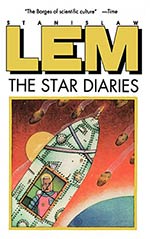
![]() charlesdee
charlesdee
2/1/2015
![]()
The morning I started reading this edition of Lem's Star Diaries, I got about a hundred pages into it. When I put it down, I felt like I had over-indulged at an all-you-can-eat buffet. Each of Ijon Tichy's intergalactic adventures in the 23rd century comes so packed with jokes, adventure, word play, hairsbreadth escapes, satire, and sophisticated scientific and philosophical speculation, they are best absorbed one at a time. They are going to all run together in the end, leaving the reader as dizzy as Lem's hero when caught in a time loop, but it's best to work your way slowly into that condition.
Tichy is a freelance space explorer who takes his rundown spaceship out of storage whenever the mood for adventure hits him. Usually he is intrigued by reports of some far distant galaxy, but along the way he is frequently blown off course and finds himself in comically dire straits with aliens who may celebrate his arrival or toss him jail or both. The one time he serves as Earth's official representative to a conference on intergalactic relations, he gets off to a poor start by mistaking his host for a vending machine. Gulliver's Travels may provide Lem's literary template, but his humor is more Monty Python than Johnathan Swift. Perhaps that comparison is compromised by the fact that Lem's stories were written in the two decades before Monty Python, but given the slippery nature of time in Lem's work, who knows who influenced whom?
Time travel, both intentional and accidental, fuels many of Tichy's adventures. Lem takes the sf chestnut of time travelers' attempts to change history - this usually involves killing Hitler - and spins it into one of his longest stories. TIchy is dragged into the 27th century to work on cleaning up history. This is a vast, bureaucratic enterprise where the punishment for screwing things up is to be stranded in the past. It's these worst bumblers that become the leading forces in Western history from Homer to Einstein. This fits well with what seems to be Lem's basic premise: (A) Things always go wrong. (B) Most things work out.
At times I wondered how Lem's satire made it past Polish censors in the 1960's. On one planet, Tichy encounters a civilization facing a serious problem of rising ocean levels. The government solution is that people learn to breath underwater. A scientist explains to Tichy
The upshot was... that what was to be controlled, controlled us. No one, however, would admit this, and of course the next logical step was the declaration that things were exactly the way they ought to be.
The published diaries are the recovered fragments of a larger work. In this book there are twelve voyages with numbers ranging from seven to twenty-eight. The numerical order does not reflect the order in which Lem wrote them. When looked at chronologically, you see Lem moving from knockabout space comedy, to more pointed satire, to philosophical speculation. The last-written and longest story, Voyage Twenty-One, is almost entirely a philosophical discussion between Tichy and a priest on a planet where things have gone horribly wrong. I confess I never made it through this one, but skipping to the end I found that Lem finished his tales on a serious down note. The priest says, "Nothing remains then for us but to sit here among the fossils of rats, in this maze of dried-up sewers."
Perhaps this is Lem's final position, but I prefer the story where Ijon Tichy reveals that he may be a figment of his father's imagination.
http://www.potatoweather.blogspot.com